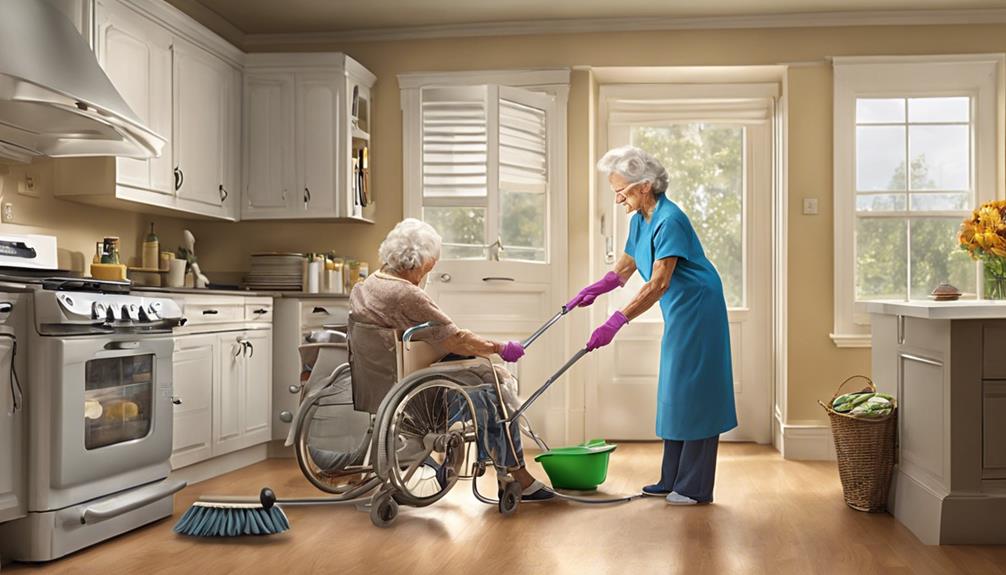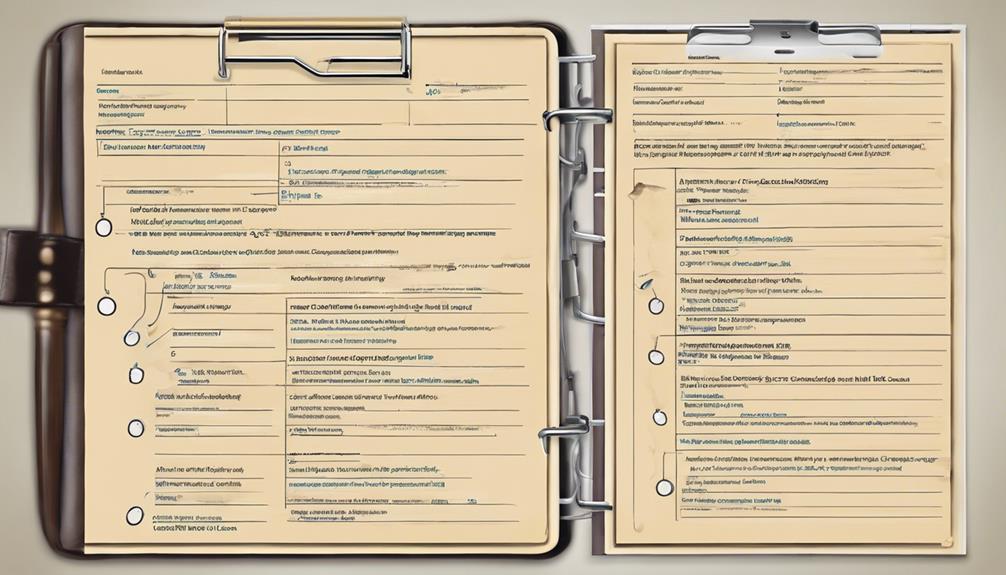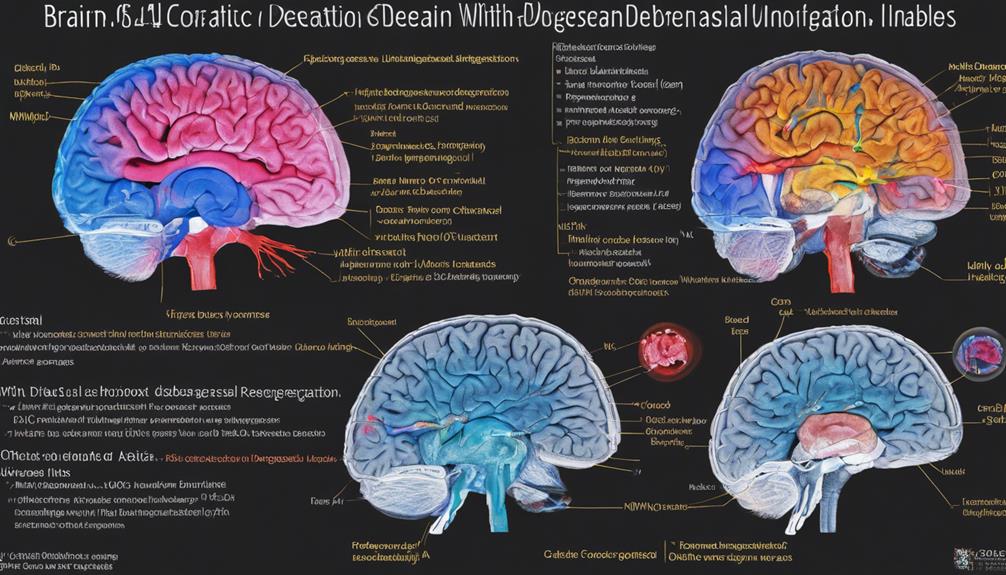Medicare covers skilled nursing and therapy services, but not non-skilled personal care such as companionship. Only medically necessary home health services provided by professionals are covered. Bill modifiers -GX, -GY, and -GZ indicate services that are not covered. Patients may be responsible for out-of-pocket expenses for non-medical care. Following Medicare guidelines can help avoid penalties. Understanding the distinction between medical and non-medical tasks is important in managing exclusions. It is crucial to be aware of Medicare’s limitations when making decisions. For more information on Medicare exclusions, detailed information is available.
Key Takeaways
- Medicare excludes coverage for non-medical home care services like companionship and meal preparation.
- Only medically necessary home health services administered by skilled professionals are covered.
- Non-skilled services such as light housekeeping are not reimbursed by Medicare.
- Patients may incur out-of-pocket costs for non-covered non-medical services.
- Understanding Medicare's limitations on non-medical services is crucial for informed decision-making.
Medicare Coverage Limitations
When considering Medicare coverage limitations for non-medical home care, it's important to understand that the services covered are primarily focused on skilled nursing and therapy. Medicare's home health benefit includes skilled nursing care provided by a registered nurse or licensed practical nurse, and therapy services such as physical therapy, occupational therapy, and speech-language pathology. These services are covered when deemed medically necessary by a healthcare provider.
It's essential to note that Medicare doesn't cover non-skilled personal care services like assistance with bathing, dressing, and meal preparation unless they're part of a plan of care that includes skilled care. Understanding the distinction between skilled nursing or therapy services and non-skilled personal care is vital when navigating Medicare coverage for home health care.
Non-Medical Services Excluded

Non-medical services such as companionship and meal preparation aren't covered by Medicare. Medicare, a health insurance program primarily focused on medical care and rehabilitation, only provides coverage for medically necessary home health services administered by skilled professionals. This means that non-medical home care services, like light housekeeping, are excluded from reimbursement as they don't involve skilled nursing or therapy. If individuals require non-medical assistance in the home, they may need to explore private pay options or other funding sources.
While Medicare plays an important role in supporting healthcare needs, it doesn't extend to non-medical services within the home. Understanding the limitations of Medicare coverage can help individuals make informed decisions when seeking assistance with activities that aren't deemed medically necessary. It's important to be aware of these exclusions to ensure proper planning and access to the necessary care for oneself or loved ones.
Billing Modifiers for Exclusions
Utilizing billing modifiers is crucial for accurately indicating non-covered services in Medicare claims. In the context of Medicare, billing modifiers such as -GX, -GY, and -GZ are specifically used to distinguish services that aren't eligible for reimbursement.
These modifiers play an essential role in clearly communicating to Medicare and other payers which services won't be covered for reimbursement. Properly understanding and applying these billing modifiers for exclusions is important to prevent claim denials and billing errors.
By using the appropriate billing modifiers, healthcare providers can transparently convey to Medicare the services that fall under the category of non-covered services. This transparency not only helps in accurate billing but also aids in facilitating the reimbursement process.
It's crucial for healthcare professionals to be well-versed in the correct application of billing modifiers when submitting claims to Medicare for services that aren't covered.
Patient Out-of-Pocket Costs

Patients may face out-of-pocket costs for non-medical home care services not covered by Medicare. Since Medicare typically doesn't include non-medical services like personal care assistance or housekeeping, patients may need to pay for these services themselves. The out-of-pocket expenses for non-medical home care can vary based on the level and type of care required. It's important for patients to understand Medicare's limitations regarding non-medical home care coverage to prepare for potential out-of-pocket costs.
Being aware of Medicare's exclusions for non-medical home care is essential for making informed decisions about care options and finances. By recognizing what services aren't covered, patients can plan ahead and budget for any out-of-pocket expenses that may arise. Understanding the potential costs associated with non-medical home care helps individuals navigate their care needs effectively while considering financial implications.
Patients should explore alternative payment options or financial assistance programs to manage out-of-pocket expenses for non-medical home care services not covered by Medicare.
Compliance With Medicare Guidelines
Ensuring adherence to Medicare guidelines is vital for avoiding penalties and consequences. Compliance with these regulations is essential in the domain of non-medical home care to maintain integrity and quality of service.
Here are four key steps to help you navigate the complex landscape of Medicare compliance:
- Regularly Check the OIG List: It's important to routinely review the OIG List of Excluded Individuals/Entities to confirm that none of your employees or contractors are on that list.
- Monitor OIG Updates: Stay informed by monitoring the OIG website for any changes in exclusion status for both current and potential employees and contractors.
- Affirmative Duty: Remember, as an employer or contractor, you have a duty to check exclusion status before hiring or contracting with individuals.
- Utilize OIG Resources: Take advantage of the resources available on the OIG website to better understand and comply with Medicare guidelines in the context of non-medical home care.
Navigating Excluded Services

To effectively manage excluded services in non-medical home care, understanding the distinction between medical and non-medical tasks is essential. Medicare coverage in non-medical home care focuses on skilled nursing and therapy services rather than personal care tasks like meal preparation or housekeeping. Since Medicare doesn't cover services that don't require skilled care, it's important to recognize the types of care that fall under non-medical tasks.
These may include assistance with daily living activities such as bathing, grooming, or medication reminders. By being aware of what Medicare considers medically necessary, caregivers can guarantee that their services align with the coverage criteria. Additionally, understanding these criteria ensures that caregivers can effectively advocate for their loved ones and secure the support they need. Access to essential home care resources can play a vital role in maintaining a recipient’s health and overall quality of life. By leveraging these resources, caregivers can provide well-rounded assistance while navigating the complexities of Medicare coverage.
Managing excluded services involves prioritizing skilled nursing and therapy while recognizing the limitations of Medicare coverage for non-medical tasks. This understanding not only helps in providing appropriate care but also in managing expectations regarding reimbursement for services rendered.
Ensuring Accurate Claims Processing

Proper coding and thorough documentation of services play a critical role in guaranteeing accurate claims processing for non-medical home care. When dealing with Medicare in the context of home care services, compliance is crucial to avoiding billing errors and ensuring that claims are processed correctly. To achieve this, it's essential to:
- Understand Medicare Coverage Guidelines: Familiarize yourself with Medicare's rules and regulations pertaining to non-medical home care services to prevent misunderstandings that could lead to claim denials.
- Regularly Monitor Compliance: Stay up to date with Medicare regulations and requirements to ensure that your claims meet the necessary criteria for processing.
- Double-Check Documentation: Review all documentation for accuracy and completeness before submitting claims to Medicare, minimizing the risk of processing delays or rejections.
- Seek Training and Guidance: Consider seeking additional training or professional guidance to guarantee that your claims processing procedures align with Medicare standards and best practices.
Frequently Asked Questions
What Services Are Excluded From Medicare?
We recognize the significance of knowing what services are excluded from Medicare. Medicare typically excludes custodial care for activities like bathing and dressing. Services not medically necessary, like companionship or housekeeping, are often not covered.
What Type of Care Does Medicare Not Cover at All?
Rest assured! Medicare won't cover non-medical care like assisting with daily activities or long-term support at home. It's all about skilled services, not the day-to-day assistance you might require. However, Medicare does provide coverage for medically necessary skilled services, such as physical therapy or nursing care. Additionally, if you qualify for hospice care, Medicare may offer hospice 24-hour home care coverage to manage symptoms and provide comfort during the end-of-life stage. It’s essential to explore all your options to ensure you receive the appropriate level of care based on your needs.
Which of the Following Is Excluded Under Medicare?
We exclude coverage for non-medical home care services like meal prep, housekeeping, and companionship. Medicare only covers medically necessary services provided by skilled professionals. Understanding this important distinction helps determine eligibility for coverage under Medicare.
Which of the Following Types of Care Is Not Covered by Medicare?
We recognize that Medicare doesn't cover non-medical home care services like assistance with daily living tasks. It's important to explore private pay, long-term care insurance, or Medicaid waivers for these needs, as Medicare focuses on skilled care.
Conclusion
As we navigate the complex world of Medicare exclusions in non-medical home care, it's important to remember that not all services may be covered.
Just like a puzzle with missing pieces, we must carefully follow the guidelines to guarantee accurate claims processing.
By understanding the limitations and exclusions, we can help paint a clear picture of what's and isn't covered, ultimately ensuring compliance and proper billing practices.









